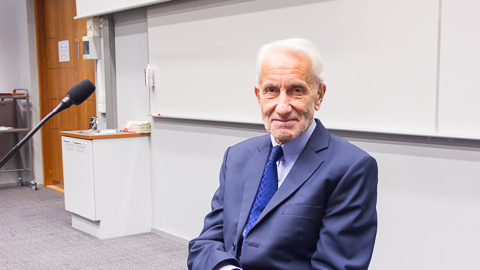Only Uncertainty Is Certain in Brexit
The process of the Brexit negotiations next spring is still a mystery, even to the experts. In addition to the United Kingdom's own decisions, the situation in other EU countries will also affect the process.

The fifth annual lecture of Turku Law School was jointly organised by the University of Turku and Åbo Akademi University at the beginning of October. The lectures are held at the beginning of the academic year and offer the speakers an opportunity to explain and stir discussion on important legal and political topics.
This year, the keynote speaker was Professor Paul Craig from the University of Oxford. Professor Craig, who is an expert on English and European law, gave a lecture on the burningly topical Brexit.
Despite his expertise, he could not give any exact predictions on how Brexit is going to proceed. In Craig's opinion, everything is uncertain but the start of the negotiations, which is timed at the end of March next year.
– This is like a slowly unfolding drama. The process is still very unclear, as at the moment we don't even know how the negotiations will proceed and what they will be about, said Craig.
Uncertain Factors in the UK and EU Muddy the Waters Further
One major issue in the UK's withdrawal from the EU is whether they will choose hard or soft Brexit.
According to Craig, a small but vocal group supports a hard Brexit. They want to withdraw from free movement and immigration within the EU completely. Nevertheless, the group would like to keep the possibility of participating in the European single market.
– They want to return to the time before the EU. In their speeches, the contracts and their cancellation sound simple, but what they do not understand is that these are long and complicated processes, criticised Craig.
Alternatively, most of the conservatives and the Parliament are in favour of a soft Brexit, where the goal would be to reach a contract with the EU similar to that of Noway. In other words, backers of soft Brexit would like to keep the access to the single market but make limitations to the free movement.
Craig believes that this scenario is unlikely. He said that free movement is a basic value in the EU and it will not make compromises on the matter.
– It is doubtful that the EU would allow a rival in a better position to gain access to the single market. In addition, this option would be expensive, Norway pays the EU vast amounts of money.
It is difficult to give any timetables to either of the Brexit scenarios. Their duration also depends on the contents of the contracts.
Moreover, the political situation in other EU countries will also influence the withdrawal process next year. Both France and Germany will have an election next year and Italy is preparing for a constitutional referendum this autumn. The results can change the power relations in surprising ways.
The estimations on the withdrawal processes have been made according to the current laws and regulations, but we should remember that those can be changed as well, Craig emphasises. He believes that the next two years will be negative to the British economy for the uncertainty of the situation alone. When Britain has no say in the EU any more, the Union can make decisions that are disadvantageous to the country.
The Professor made his own opinion on Brexit very clear: – I don't like the result of the referendum. It's a disaster.
Text and photo: Saara Järviö
Translation: Mari Ratia